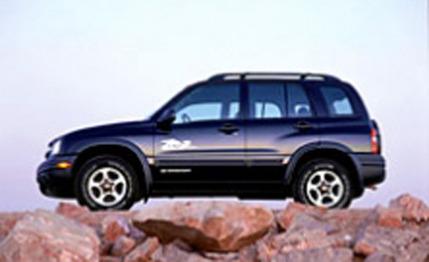 Short Take Road Test
Short Take Road Test
Remember when Kentucky Fried Chicken suddenly became KFC after was determined that "fried" was losing its appeal as an appetizing buzzword? Reminds us of how GM, after nine years of marketing Japanese-designed Geos, jumped on the "buy American" bandwagon last year and rebadged them as Chevrolets. For 1999, the Chevrolet Tracker was redesigned, although it continues to be built in Canada alongside its Suzuki Vitara twin. So, has the chicken changed or just the name on the outside of the bucket?
Well, for starters, it looks better. Chevy designers penned a smoothly sculpted modem shape to replace the crude, blocky body of the original Tracker hardtop, which was unveiled in 1996.
Changes in exterior dimensions are mostly minor except for a 2.1-inch increase in width. This makes room for a third seatbelt in the rear, but the middle person had better be a small child. The rear seat is farther back, increasing legroom but shrinking cargo space from 21 cubic feet to 20. When that seat is folded for hauling, though, the Tracker's 35-cube capacity is 11 less than last year's. (Five-door Toyota RAV4s have 27 and 58 cubic feet, respectively.)
The generally good-looking cabin feels airy and has legible instruments and user-friendly ergonomics. The fabric seats look nice but lack lumbar support.
Trackers come in just one trim level, as three-door convertibles or five-door hard-tops, with rear- or four-wheel drive. The carry-over SOHC 1.6-liter four (which now makes two more hp, 97 in all) is standard in the softtops, and a new 127-hp. 2.0-liter DOHC four is standard in the hard-tops. The truck-based frame (and a choice of transmissions) is retained. In addition, the steering has been upgraded to a more accurate rack-and-pinion design; trailing links and a Panhard rod replace diagonal links for better lateral control of the live rear axle; and a shift-on-the-fly (up to 60 mph) setup is now standard on four-wheel-drive Trackers.
We rated the performance of the old 1.6-liter convertible Tracker (95 hp pulling 2600 pounds) as just adequate. So we're a bit disappointed that the 2.0-liter's 32 more horses do not offset the weight and acceleration handicaps of our automatic-equipped four-wheel-drive hardtop. Performance is still merely adequate, despite a 12 percent better power-to-weight ratio. The Tracker goes when the light turns green but pleads for mercy when pushed above 55 mph. Grabbing 60 mph takes 12.2 seconds.
Even with an automatic, though, the Tracker is quicker than a manual Kia Sportage (the snail of this class), but it's at least a second off the pace set by the last similarly equipped Honda CR-V we tested, which had an engine with 20 less horse-power than this year's CR-V. Even wearing new, larger front rotors and pads, our '99 Tracker required 30 more feet than the Honda to stop from 70 mph (both disc-and-drum setups had ABS). The more open tire tread pattern on our four-wheel-drive truck may have lowered braking and lateral grip. The Tracker generated 0.64 g on the skidpad-below average for the class.
At speed on the highway, this new Chevy is surprisingly quiet inside, but it requires a lot of steering correction and gets pushed around in windy weather. Hard braking and evasive maneuvers are not confidence inspiring, either. In town, though, its compact dimensions and tight turning circle make the Tracker a nimble errand runner.
Off-road, things are much better. With its truck frame, mud-and-snow tires, eight inches of ground clearance, and two-speed transfer case featuring a low creeper gear, the Tracker's up for the rough stuff.
The base price of a hardtop Tracker is $15,195. Four-wheel drive adds $1100, and the four-speed automatic is a $1000 option we'd pass on. It's a reluctant shifter, and although the manual is a bit notchy, it works much better in passing situations.
So a $17,295 Tracker sounds like a better idea than a $20,165 CR-V or a $21,290 Subaru Forester--at first. But that's a bare-bones Tracker--no power anything and no air conditioning. The CR-V and the Forester come fully out-fitted. Adding $4516 in options inflated our Tracker's bottom line to $20,811, which now sounds less economical considering alternatives that boast independent rear suspensions, permanent high-range all-wheel drive, and less jittery on-road rides. Nice, if that's where you spend the majority of your driving time, but they do lack the Tracker's trucklike off-road assets.
So the Tracker now has a name as American as apple pie--and fried chicken. And although there are many appetizing choices in this class, Chevrolet is hoping your tastes will remain American.